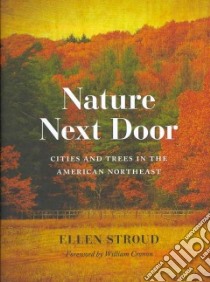Nature Next Door - 9780295992082
Un libro in lingua di Ellen Stroud Cronon William (FRW) edito da Univ of Washington Pr, 2012
- € 21.50
- Il prezzo è variabile in funzione del cambio della valuta d’origine
The once denuded northeastern United States is now a region of trees. Nature Next Door argues that the growth of cities, the construction of parks, the transformation of farming, the boom in tourism, and changes in the timber industry have together brought about a return of northeastern forests. Although historians and historical actors alike have seen urban and rural areas as distinct, they are in fact intertwined, and the dichotomies of farm and forest, agriculture and industry, and nature and culture break down when the focus is on the history of northeastern woods. Cities, trees, mills, rivers, houses, and farms are all part of a single, transformed, regional landscape.
In this examination of the cities and forests of the northeastern United States-with particular attention to the woods of Maine, New Hampshire, Pennsylvania, and Vermont-Ellen Stroud shows how urbanization processes fostered a period of recovery for forests, with cities not merely consumers of nature but creators as well. Interactions between city and hinterland in the twentieth-century Northeast created a new wildness of metropolitan nature: a reforested landscape intricately entangled with the region's cities and towns.
Ellen Stroud is an environmental historian at Bryn Mawr College, where she is an associate professor in the Growth and Structure of Cities Department, and holds the Johanna Alderfer Harris and William H. Harris M.D. Chair in Environmental Studies.
"Stroud's idea that forests were shaped by human choice is an important complement to the standard story of forest succession in abandoned farmlands in the Northeast." -Richard Judd, University of Maine
"Nature Next Door shows how urbanization, farm abandonment, state policies, and conservation have left the American Northeast far more forested than it has been since the eighteenth century or before. It is among the most profound and surprising transformations in the history of the American landscape -- and quite different from the usual stories of decline and degradation that are so familiar in environmental history. No one has written about this process with greater subtlety, intelligence, and literary grace than Ellen Stroud." -from the Foreword by William Cronon
Informazioni bibliografiche
- Titolo del Libro in lingua: Nature Next Door
- Sottotitolo: Cities and Trees in the American Northeast
- Lingua: English
- Autori : Ellen Stroud Cronon William (FRW)
- Editore: Univ of Washington Pr
- Collana: Univ of Washington Pr (Hardcover)
- Data di Pubblicazione: 24 Settembre '12
- Genere: NATURE
- Argomenti : Trees in cities Northeastern States Urban forestry Northeastern States Urban ecology (Sociology) Northeastern States
- Pagine: 207
- Dimensioni mm: 228 x 152 x 0
- ISBN-10: 0295992085
- EAN-13: 9780295992082


